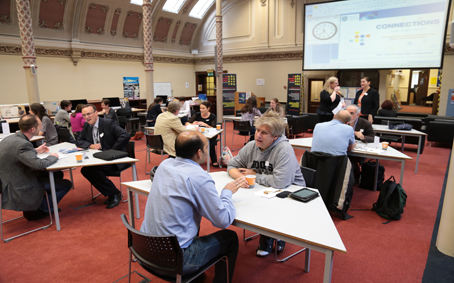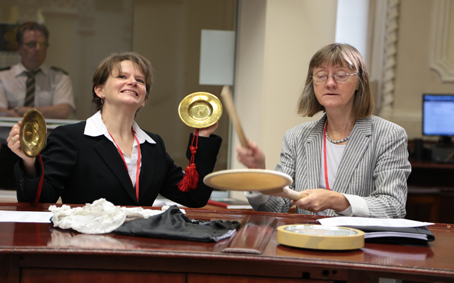Trinity College Holds Ideas ’speed-Dating’ Event for Researchers
Posted on: 09 October 2014
Over 60 Trinity researchers from across the College’s academic disciplines recently came together for a different kind of scholarly presentation: ‘Idea Speed Dating’. The event, ‘Connections: Facilitating Creative Matches for your Research,’ was hosted in the College’s Innovation Academy at Foster Place where 95 fifteen minute conversations took place over the course of the four hour event.
Initially instigated as a part of Trinity’s commitment to increasing participation in Horizon 2020 funded projects, the goal of the event was not so much to lead to immediate funding but to give researchers a forum for understanding the impact of their work outside of their home discipline and for accessing networks in other areas as well. This is a unique approach to helping researchers break in to EU funding, complementing the usual interventions, such as training sessions and informational briefings.

“We were thrilled to have such a good turn out, and to see so many people getting really excited about the meetings they had,” stated Director of Strategic Projects at the Faculty of Arts, Humanities and Social Sciences, Dr Jennifer Edmond, a key individual behind the event. “These brokerage events are often hosted at big European meetings and we felt that holding one at Trinity would be just the thing to help people ‘get their feet wet’ in terms of seeking opportunities for collaborative funding. Sometimes providing a safe place to test ideas is the best way of fostering radical innovation, and I really look forward to seeing the long term impact of the event we have hosted.”
Designing and organising the event was the work of a large team including staff from the College’s Research Development Office and local Research Project Officers from the faculties and schools with broad knowledge of their colleagues’ work, who were able to see beyond what their colleagues were working on at the moment to where that work might lead and what it might mean for someone else’s work. Although each pairing had a different rationale behind it, every conversation focused on interdisciplinary research ideas the researchers had either proposed or responded to as something they wanted to share with other colleagues, and extend their knowledge beyond their usual methods and discipline.

